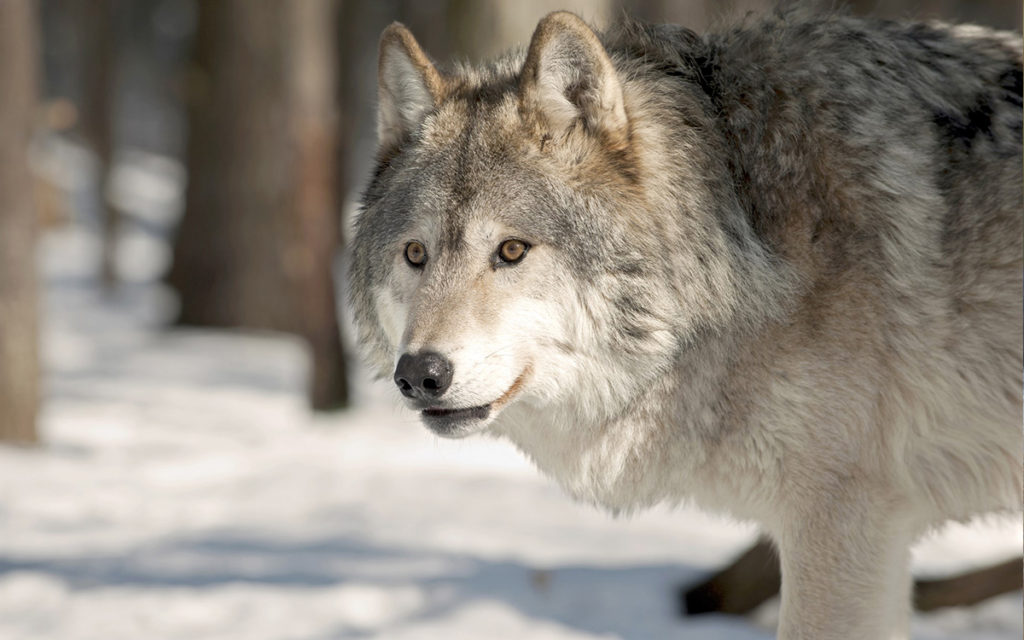Many animal advocates know that cattle production is one of the biggest sources of greenhouse gas emissions. Methane and other gases from cattle are adding fuel to the warming crisis, threatening the economy and ecology of the planet in ways small and large.
There’s also the more specific set of impacts of cattle grazing on our public lands, particularly in the West. The plodding and heavy steps of these bovids combined with their prodigious appetites – to say nothing of their high-volume and random discharge of waste — have the effect of uprooting plants and compacting the untethered soil, degrading arid landscapes and vital riparian areas alike.
A third effect of cattle ranching – not forgetting about the plight of the animals themselves, nor their typical journey from public or private lands to feedlots and then to mechanized slaughterhouses that disassemble them – is the liquidating of so many free-ranging, large mammalian predators.
It’s a matter of historical record that ranchers not only did a good bit of predator killing themselves, but also provided the political impetus for the adoption and implementation of local, state, and federal government predator bounty programs and other government policies that all but wiped out several species. These programs offered government payments to individuals who’d turn in heads, hides, and tails of wolves, mountain lions, and other carnivores, exterminating the animals, to one degree or another, from broad swaths of their original range.
Today, ranchers continue to drive regressive federal and state policies related to wildlife. Our federal government, through a benign-sounding but extraordinarily deadly U.S, Department of Agriculture program called Wildlife Services, spends tens of millions a year to kill tens of thousands of predators, often on our public lands, with an array of traps, poisons, and aerial gunships.
But one of the most outrageous examples of their handiwork is happening right now in Washington state. There, a ranch family is almost single-handedly upending the state’s otherwise forward-looking wolf management program.
State officials there estimate there are as few as 125 wolves left in the entire state, and to the consternation of citizens, the Department of Fish and Wildlife previously authorized the wiping out of the Profanity Peak pack in 2016, and now has issued kill orders for members of a new pack called the Old Profanity Territory pack.
“Rancher Len McIrvin and the Diamond M Ranch are responsible for killing an astonishing 85 percent of wolves killed through depredation permits in Washington on public lands over the last decade,” observed Rob Wielgus, a wildlife biologist and former director (retired) of the Large Carnivore Conservation Laboratory at Washington State University in Pullman, in the far eastern part of the state. “My research shows that non-lethal controls, such as keeping livestock and salt blocks one kilometer away from wolf denning and rendezvous areas, are very effective in deterring rare wolf attacks on livestock.”
On Sunday, Animal Wellness Action and its partner organizations launched an ad campaign urging state officials to halt the work of aerial gunners and foot soldiers working to kill the Old Profanity Territory wolves. The pandering and appeasing of this one rancher is wrong and unwarranted, and the state must advocate for the position that ranchers have responsibilities to wildlife, too. It’s not their right to demand the destructions of predators, and especially not when they exhibit reckless animal husbandry practices and take a disdainful approach to wildlife.
Wielgus points out that livestock losses to wolves represent just one-third of one percent (0.003) in wolf-occupied areas of Washington. But the ranching operations of Len McIrvin, who generally refuses to modify his grazing and salting locations, has produced cattle losses that are 10 times as large as those of others in the profession in the state.
Animal Wellness is asking Washington residents to complain to Mr. Kelly Susewind, the director of Washington’s Department of Fish and Wildlife, urging him to put a stop to more killing of wolves, particularly when it comes to overheated complaints from Len McIrvin.
This campaign comes on the heels of our effort to oppose federal de-listing of wolves in the lower 48 states. That campaign, along with the efforts of so many other national organizations with a shared purpose on this issue, generated perhaps as many as 1.8 million comments in opposition to de-listing.
That record-setting outpouring of public concern to a rule-making action concerning a rare species reveals that Americans increasingly understand the ecological value of wolves and respect and support their right to reclaim at least some of their original range. More and more Americans want to see an end to the hatred and myth-making related to wolves. Irrational behavior flares up too often still, but neither the public nor state wildlife agencies should tolerate it. Instead, the agencies need to shed their role as a obedient service agents for ranchers and trophy hunters and lead us, reminding all stakeholders about the importance of wolves in the matrix of life on our planet.
